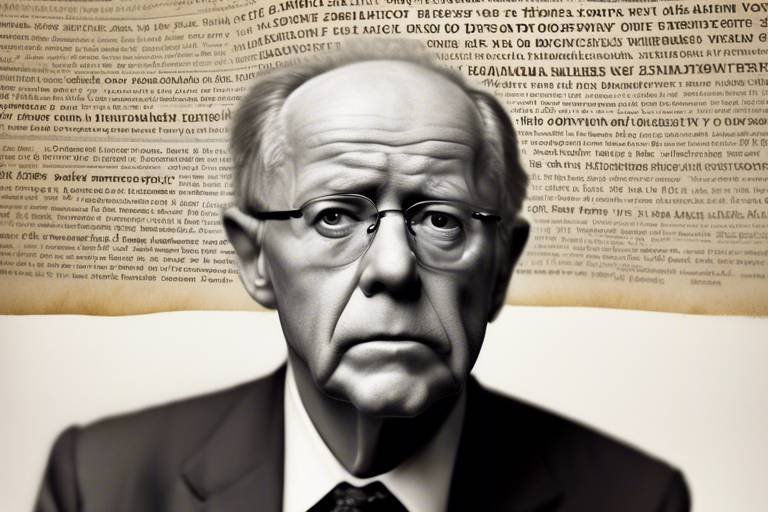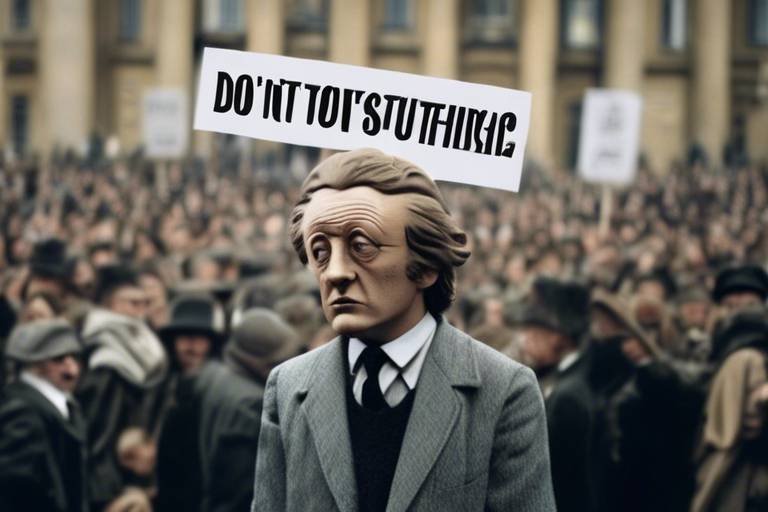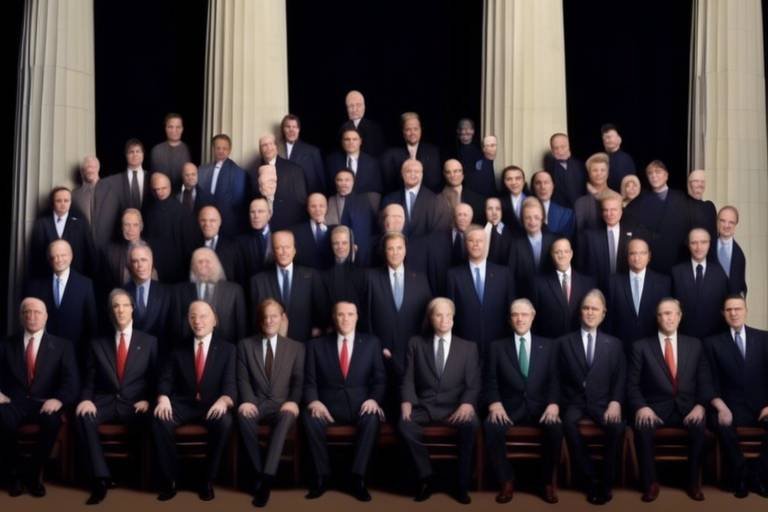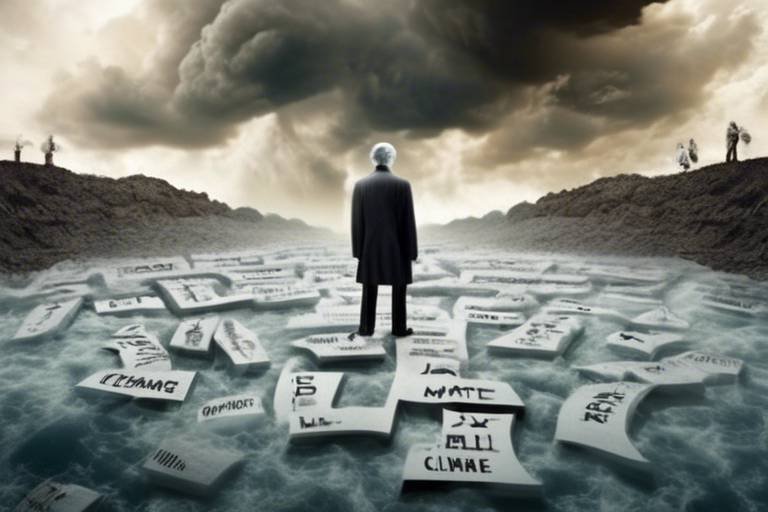The Role of Ethics in Politics - A Philosophical Inquiry
In the grand tapestry of human society, where power dynamics and governance intertwine, the role of ethics in politics emerges as a crucial thread. Imagine a ship navigating through turbulent seas; without a compass, it risks veering off course into dangerous waters. Similarly, ethics serves as that compass for political leaders, guiding their decisions and actions toward the common good. But what exactly is the relationship between ethics and politics? How do moral principles shape the actions of those in power, and what are the implications for society as a whole? This inquiry delves deep into these questions, examining the intricate balance between ethical considerations and political actions.
At its core, political ethics is about more than just rules and regulations; it's about understanding the moral responsibilities that come with power. Politicians are not just decision-makers; they are stewards of public trust. When they make choices, they must consider not only the legal ramifications but also the ethical implications of their actions. This duality is where the complexity lies. For instance, a policy might be legally sound but morally questionable, leading to a disconnect between what is right and what is permissible. This tension is a recurring theme in political discourse, prompting us to ask: should legality always align with morality?
Throughout history, the discourse on political ethics has been enriched by the contributions of various philosophers who have shaped our understanding of governance and morality. From the idealism of Plato to the virtue ethics of Aristotle and the consequentialism of modern utilitarianism, these thinkers have provided frameworks that continue to influence contemporary political thought. Their insights remind us that ethical governance is not just an ideal but a necessity for a just society. As we explore these historical perspectives, we can see how the philosophical underpinnings of ethics in politics have evolved, yet remain relevant in today’s political landscape.
The implications of ethical decision-making in politics are profound. When leaders prioritize ethics, they foster a culture of accountability and trust, encouraging citizen engagement and participation. Conversely, when ethical breaches occur, they can lead to disillusionment and apathy among the populace. This cyclical relationship between ethics and public trust highlights the importance of maintaining integrity in governance. As we navigate through contemporary political dilemmas, it becomes increasingly clear that the stakes are high, and the need for ethical leadership is more pressing than ever.
In the following sections, we will explore the historical perspectives on political ethics, the intersection of law and ethics, and the role of public opinion in shaping political behavior. By examining these facets, we aim to uncover the essential role that ethics plays in ensuring that governance serves the interests of all citizens, rather than the few.
- What is political ethics? Political ethics refers to the moral principles that guide the behavior of politicians and public officials in their decision-making processes.
- Why is ethics important in politics? Ethics is crucial in politics as it fosters accountability, trust, and integrity in governance, ensuring that leaders act in the best interest of society.
- How have historical philosophers influenced political ethics? Philosophers like Plato and Aristotle have laid the groundwork for understanding the moral responsibilities of leaders, shaping contemporary political thought.
- What are some contemporary ethical dilemmas in politics? Issues such as corruption, accountability, and the balance between individual rights and collective welfare are significant ethical challenges faced by modern politicians.

Defining Political Ethics
Political ethics, at its core, refers to the moral principles that guide the behavior of politicians and public officials. It's like the invisible hand that shapes their decisions and actions in the pursuit of the common good. Imagine a compass that helps leaders navigate the often turbulent waters of governance, ensuring they remain aligned with values that benefit society as a whole. Without these ethical guidelines, political leaders might drift towards self-interest, corruption, or decisions that serve only a select few.
To better understand political ethics, it's essential to recognize its multifaceted nature. It encompasses various dimensions, including integrity, accountability, and transparency. These elements are crucial for fostering trust between the public and its leaders. When politicians adhere to ethical standards, they not only enhance their credibility but also strengthen the democratic fabric of society. This relationship can be summarized in the following key points:
- Integrity: The commitment to honesty and moral principles in decision-making.
- Accountability: The obligation of leaders to explain their actions and decisions to the public.
- Transparency: The practice of openly sharing information and processes with the public to foster trust.
Moreover, political ethics is not just about individual behavior; it also encompasses the broader ethical frameworks within which policies are formulated and implemented. For instance, ethical considerations play a crucial role in issues such as healthcare access, environmental policies, and social justice. When political leaders prioritize ethical standards, they are more likely to create policies that reflect the values and needs of their constituents.
However, the challenge lies in the fact that political ethics can sometimes be subjective. What one group considers ethical, another might view as questionable. This subjectivity can lead to conflicts and debates about what constitutes ethical behavior in politics. For example, take the issue of campaign financing. Some argue that substantial donations from corporations can lead to ethical dilemmas, while others believe that it is a legitimate part of the political process. This divergence of opinions highlights the complexity of defining political ethics.
In conclusion, political ethics serves as the bedrock of a functioning democracy. It is essential for ensuring that leaders act in the best interests of their constituents, promoting fairness and justice. As society evolves and new challenges arise, the dialogue around political ethics must continue, adapting to the changing landscape while remaining committed to the principles that uphold the common good.

Historical Perspectives on Ethics in Politics
The exploration of ethics in politics is not a modern phenomenon; rather, it has deep roots that stretch back through the annals of history. Various philosophers have pondered the intricate relationship between morality and governance, offering insights that resonate even in today's political landscape. These historical perspectives help us understand how ethical considerations have shaped political thought and action over time.
One of the earliest and most influential thinkers in this domain is Plato. In his works, particularly "The Republic," he introduces the concept of the philosopher-king. Plato argues that only those who possess wisdom and virtue should lead, as ethical governance is essential for achieving a just society. He believed that a ruler must be more than just a politician; they must be a moral guide who understands the greater good. This idealism suggests that the leaders' ethical framework is crucial in crafting policies that benefit all, rather than a select few.
Following in Plato's footsteps, Aristotle offers a more pragmatic approach with his concept of virtue ethics. He emphasizes the importance of character and moral virtues in political life, advocating for leaders who embody ethical principles. Aristotle posits that a good leader must not only act rightly but also cultivate virtues such as courage, justice, and temperance. His belief is that the character of a political leader directly influences the health of the state. In this way, Aristotle's thoughts provide a foundation for understanding how personal morality can impact governance.
Fast forward to the modern era, and we encounter the philosophy of utilitarianism, largely attributed to thinkers like John Stuart Mill. This school of thought shifts the focus from the character of the leader to the consequences of political actions. Utilitarianism suggests that the morality of an action should be evaluated based on its outcomes, specifically aiming for the greatest good for the greatest number. This perspective introduces a different ethical lens through which political decisions can be analyzed, emphasizing the importance of considering the broader societal impact rather than individual moral standing.
These historical perspectives on ethics in politics not only enrich our understanding of political philosophy but also serve as a guiding light for contemporary political practices. By examining the thoughts of Plato, Aristotle, and Mill, we can better appreciate the ongoing dialogue about the role of ethics in governance. Their insights remind us that the moral fabric of leadership is woven from both individual character and the consequences of decisions made at the highest levels of power.
As we navigate the complexities of modern governance, it’s essential to reflect on these philosophical foundations. They remind us that the quest for ethical leadership is not merely an academic exercise but a vital component of a functioning democracy. The lessons from history urge current and future leaders to prioritize ethical considerations in their decision-making processes, ultimately shaping a more just and equitable society.

Plato's Idealism
Plato, one of the most influential philosophers in Western thought, introduced a concept that resonates deeply with the foundations of political ethics: the idea of the philosopher-king. In his seminal work, "The Republic," Plato argues that the ideal ruler should not only possess power but also embody wisdom and virtue. This notion raises an intriguing question: can a society truly thrive under leadership that lacks ethical grounding? Plato believed that the answer is a resounding no. He posited that ethical governance is essential for a just society, where leaders are not merely politicians but guardians of the common good.
At the heart of Plato's idealism is the belief that true knowledge and understanding are paramount for effective governance. He argued that those who govern should have a deep understanding of the Forms, especially the Form of the Good. This philosophical framework suggests that only individuals who grasp the essence of goodness can make decisions that benefit society as a whole. In other words, a ruler's ethical mindset directly influences their political decisions, ultimately shaping the fabric of society.
Moreover, Plato's vision extends beyond individual leaders to the structure of the state itself. He advocated for a society organized in a way that promotes ethical behavior among its citizens. This includes the establishment of laws and institutions that encourage virtue and discourage vice. Plato's ideal state is not merely a political entity; it is a moral community where the pursuit of the common good is the highest priority.
In practical terms, Plato's idealism raises several critical implications for contemporary politics. For instance, it challenges us to reflect on the qualities we seek in our leaders. Are we prioritizing charisma and popularity over wisdom and ethical integrity? Furthermore, Plato's philosophy invites us to consider the systems we have in place to ensure accountability and ethical behavior among those in power. Are our political institutions designed to uphold moral principles, or do they inadvertently foster corruption and self-interest?
In conclusion, Plato's idealism serves as a timeless reminder of the profound connection between ethics and politics. It urges us to strive for leaders who possess not only the ability to govern but also the moral compass to guide their decisions. As we navigate the complexities of modern governance, Plato's insights continue to challenge us to envision a political landscape where ethics reign supreme, ultimately leading to a more just and equitable society.

Aristotle's Virtue Ethics
Aristotle's virtue ethics presents a fascinating lens through which we can examine the interplay of morality and politics. At its core, virtue ethics emphasizes the significance of moral character and the virtues that individuals possess. Aristotle believed that a good life is one that is lived in accordance with virtue, which he defined as a disposition to act in ways that benefit both the individual and society at large. This perspective is particularly relevant in the political realm, where leaders are often faced with complex decisions that can impact the lives of many.
In Aristotle's view, political leaders should not merely be skilled in governance but should also embody virtues such as courage, temperance, and justice. He argued that a virtuous leader would naturally seek the common good, as their character would drive them to prioritize the welfare of the community over personal gain. This idea leads us to consider the essential qualities that an ethical politician should possess:
- Courage: The ability to face challenges and make tough decisions, even in the face of adversity.
- Temperance: The practice of moderation and self-control, particularly in the pursuit of power and influence.
- Justice: A commitment to fairness and equity, ensuring that the needs of all citizens are considered in policy-making.
Aristotle's ethical framework encourages us to reflect on the kind of leaders we want in our political systems. Are we looking for individuals who are merely competent, or do we desire leaders who possess a strong moral compass? The latter seems essential, especially in an age where political scandals frequently dominate the headlines. By fostering leaders who embody these virtues, we can hope to create a political landscape that not only addresses the needs of the present but also lays a foundation for a just and equitable future.
Moreover, Aristotle's virtue ethics highlights the importance of community in shaping moral character. He believed that individuals are influenced by their surroundings and that a virtuous society cultivates virtuous individuals. This notion suggests that the responsibility for ethical governance does not rest solely on the shoulders of politicians but also on the citizens who elect them. As such, engaging in civic duties and advocating for ethical standards can contribute to a healthier political environment.
In conclusion, Aristotle's virtue ethics provides a compelling argument for the necessity of moral character in political life. By aspiring to cultivate virtues within ourselves and demanding them from our leaders, we can contribute to a political culture that values integrity and the common good. As we navigate the complexities of modern governance, let us remember Aristotle's timeless wisdom: the pursuit of virtue is not just a personal endeavor but a collective one that can shape the very fabric of our society.
What is Aristotle's virtue ethics?
Aristotle's virtue ethics is a moral philosophy that emphasizes the importance of character and virtues in ethical decision-making. It posits that individuals should strive to develop virtuous traits, which in turn will lead to a good and fulfilling life.
How does virtue ethics apply to politics?
Virtue ethics applies to politics by highlighting the need for political leaders to possess moral character and virtues such as courage, justice, and temperance. This approach suggests that ethical governance is rooted in the virtues of those in power.
Why are virtues important for political leaders?
Virtues are important for political leaders because they guide decision-making and behavior. Leaders with strong moral character are more likely to prioritize the common good and make choices that benefit society as a whole, rather than acting out of self-interest.
Can citizens influence political ethics?
Yes, citizens can influence political ethics by advocating for accountability and transparency in governance. Engaging in civic duties and promoting ethical standards can help create a political culture that values integrity.

Modern Utilitarianism
Modern utilitarianism, a philosophical doctrine that has shaped political ethics, centers around the idea that the morality of an action is determined by its consequences. This school of thought, primarily associated with the works of John Stuart Mill, posits that the best action is the one that maximizes happiness or well-being for the greatest number of people. In a world where political decisions can have far-reaching effects, utilitarianism offers a pragmatic approach to governance, urging leaders to consider the broader impact of their policies.
At its core, modern utilitarianism challenges politicians to weigh the potential outcomes of their actions. For instance, when a government is faced with a decision about implementing a new healthcare policy, a utilitarian perspective would encourage them to evaluate how this policy affects the population at large. Would it lead to improved health outcomes? Would it be equitable? These questions are essential in ensuring that political actions are not only legally sound but also ethically justified.
However, the application of utilitarianism in politics is not without its challenges. Critics argue that this approach can lead to the neglect of minority rights in favor of the majority's happiness. For example, if a policy benefits 90% of the population but harms a minority group, a strict utilitarian might still support it. This raises important ethical questions about justice and fairness. Thus, while utilitarianism provides a valuable framework for assessing political decisions, it must be balanced with considerations of equity and justice.
To illustrate the impact of modern utilitarianism, consider the following table that summarizes key principles and criticisms of this ethical framework:
| Principles | Criticisms |
|---|---|
| Focus on the greatest good for the greatest number | Can overlook individual rights |
| Emphasizes outcomes and consequences | May justify harmful actions if they benefit the majority |
| Encourages a pragmatic approach to ethics | Can lead to subjective interpretations of 'happiness' |
In contemporary politics, utilitarianism is often invoked in debates around issues such as healthcare reform, environmental policies, and social justice initiatives. Politicians frequently find themselves in the position of having to make tough choices that will benefit the majority while attempting to mitigate harm to others. This balancing act is where the true test of ethical leadership lies.
Ultimately, modern utilitarianism serves as a crucial lens through which we can evaluate political actions. It compels leaders to consider not just the legality of their decisions but the ethical implications as well. By prioritizing the happiness and well-being of the populace, politicians can strive towards a more just and equitable society. However, as we navigate this complex landscape, it is essential to remain vigilant about the potential pitfalls of utilitarian reasoning, ensuring that all voices are heard and respected in the democratic process.
- What is modern utilitarianism?
Modern utilitarianism is a philosophical theory that evaluates the morality of actions based on their outcomes, aiming for the greatest happiness for the greatest number of people. - Who is a key figure in modern utilitarianism?
John Stuart Mill is one of the most prominent philosophers associated with modern utilitarianism, advocating for the consideration of consequences in ethical decision-making. - What are some criticisms of utilitarianism?
Critics argue that utilitarianism can neglect individual rights and may justify harmful actions if they benefit the majority, raising concerns about justice and fairness. - How does utilitarianism apply to politics?
Utilitarianism influences political decision-making by urging leaders to consider the broader impact of their policies on the population, balancing the needs of the majority with those of minorities.

Contemporary Ethical Dilemmas in Politics
In today's political landscape, we are bombarded with a myriad of ethical dilemmas that challenge the very fabric of governance. These dilemmas often arise from the tension between personal ambition and the public good. Politicians find themselves at a crossroads where their decisions can either uplift society or lead to significant moral failings. One of the most pressing issues is corruption, which can manifest in various forms, from bribery to nepotism. When leaders prioritize personal gain over their constituents' needs, the trust between the public and their representatives erodes, leading to a disillusioned electorate.
Moreover, the concept of accountability has become a hot topic in political discussions. In an age where information is readily accessible, citizens are more informed than ever. They demand transparency and ethical behavior from their leaders. However, the challenge lies in the fact that many politicians may act within legal boundaries yet still engage in ethically questionable practices. This discrepancy raises the question: should legality be the only measure of a politician's integrity? The answer is a resounding no. The moral compass guiding political decisions should be as critical as the laws governing them.
Another significant ethical dilemma is the balance between individual rights and collective welfare. In democratic societies, the protection of individual freedoms is paramount. However, there are instances where the collective good may necessitate limitations on certain rights. For example, during a public health crisis, governments may impose restrictions that infringe on personal liberties to protect the greater population. This raises a fundamental question: how do we determine when it is justifiable to prioritize the collective over the individual? The discussions surrounding this issue are often heated, reflecting the diverse opinions within society.
Furthermore, the rise of populism has introduced a new layer of complexity to ethical political discourse. Populist leaders often appeal to the emotions of the masses, sometimes at the expense of factual accuracy and ethical considerations. This can lead to a dangerous environment where misinformation flourishes, and ethical standards are compromised for political gain. Citizens must remain vigilant and critical of the narratives presented to them, ensuring that they hold their leaders accountable for both their words and actions.
As we navigate these contemporary ethical dilemmas, it's vital to engage in open discussions about the values and principles that should guide our political systems. By fostering a culture of ethical awareness, we can encourage politicians to act with integrity and prioritize the common good over personal ambitions. The road ahead may be fraught with challenges, but it also presents an opportunity for growth and reform in our political landscape.
- What are the main ethical dilemmas in politics today?
Some of the main issues include corruption, accountability, the balance between individual rights and collective welfare, and the influence of populism.
- How can citizens hold politicians accountable?
Citizens can engage in civic activities, advocate for transparency, and use media platforms to voice their concerns and demands for ethical governance.
- Why is the distinction between legal and moral obligations important?
This distinction is crucial because actions may be legally permissible yet ethically questionable, impacting public trust and governance.
- What role does the media play in political ethics?
The media acts as a watchdog, holding politicians accountable and shaping public discourse on ethical standards.

The Intersection of Law and Ethics
The relationship between law and ethics is intricate and multifaceted, often leading to heated debates among scholars, politicians, and the general public. At its core, law serves as a framework that regulates behavior, while ethics provides the moral compass that guides individuals in making decisions. While these two domains frequently overlap, they are not synonymous. Legal frameworks are designed to maintain order and protect rights, but they may not always align with ethical principles. This misalignment can create situations where actions are legally permissible yet ethically questionable, raising profound questions about the nature of justice and morality in governance.
For instance, consider a scenario where a politician exploits loopholes in campaign finance laws to accept large donations from corporations. Legally, they may be within their rights, but ethically, they might be compromising the integrity of the political system. This brings us to the crucial distinction between legal obligations and moral obligations. Legal obligations are dictated by law and enforced by the state, while moral obligations stem from personal or societal ethical standards. Understanding this distinction is vital for politicians, as their actions can significantly impact public trust and the health of democracy.
Moreover, the complexities of this relationship are evident in various case studies of ethical breaches within politics. Historical examples, such as the Watergate scandal or the more recent controversies surrounding political figures and their conduct, illustrate how legal actions can sometimes fall short of ethical expectations. These incidents serve as stark reminders of the necessity for politicians to uphold not just the letter of the law, but also the spirit of ethical governance. The repercussions of failing to do so can be catastrophic, leading to loss of public trust, damaged reputations, and even legal consequences.
In light of these challenges, it becomes essential for political leaders to cultivate a robust understanding of both law and ethics. This dual awareness can guide their decision-making processes, ensuring that they not only comply with legal standards but also embody the ethical ideals that society expects from them. As we navigate the complexities of modern governance, the interplay between law and ethics remains a critical area of inquiry, prompting ongoing discussions about how best to achieve a just and equitable society.
- What is the difference between law and ethics? Law refers to the system of rules that are created and enforced through social or governmental institutions, while ethics pertains to moral principles that govern individual behavior.
- Can something be legal but unethical? Yes, there are many instances where actions may be legally permissible, yet they may violate ethical standards or societal norms.
- Why is it important for politicians to understand ethics? A strong grasp of ethics helps politicians make decisions that foster public trust and uphold the integrity of the political system.

Legal vs. Moral Obligations
When we delve into the intricate world of politics, one of the most compelling discussions revolves around the distinction between legal and moral obligations. At first glance, these two concepts might seem synonymous, yet they diverge significantly in practice. Legal obligations are dictated by the laws of the land, established through legislative processes and enforced by judicial systems. They provide a framework within which individuals and entities must operate to avoid penalties. On the other hand, moral obligations stem from ethical principles and societal norms, guiding behavior based on what is deemed right or wrong by the community or an individual's conscience.
Consider a politician who finds themselves in a situation where they can legally accept a large donation from a corporation with a questionable track record. Legally, they are within their rights to accept this funding, as there may be no laws prohibiting such actions. However, morally, it raises a red flag. Is it ethical to accept money from a source that could potentially influence their decision-making in favor of corporate interests over the public good? This scenario encapsulates the tension between legal permissibility and ethical responsibility.
To further illustrate this distinction, let's look at a few examples:
- Legal Obligation: A politician must file financial disclosures as mandated by law. Failure to do so can result in legal sanctions.
- Moral Obligation: That same politician, aware of a conflict of interest, should voluntarily disclose any potential biases in their decision-making process, even if not legally required.
- Legal Obligation: A government official may be required to uphold certain policies that may not align with their personal beliefs.
- Moral Obligation: They should advocate for changes to those policies if they believe they cause harm to the community they serve.
Understanding these distinctions is crucial for politicians, as navigating the waters between legality and morality can often lead to complex dilemmas. The challenge lies in recognizing that just because something is legal does not inherently make it ethical. This realization is vital for maintaining public trust and integrity in governance. Politicians who prioritize moral obligations alongside their legal duties are more likely to foster a sense of accountability and transparency, which is essential for a healthy political environment.
In conclusion, the chasm between legal and moral obligations serves as a reminder that politics is not merely a game of rules and regulations. It is a field deeply intertwined with human values and ethics. As citizens, we must demand that our leaders navigate these complexities with a strong moral compass, ensuring that their decisions serve the greater good rather than merely fulfilling legal requirements.
- What is the difference between legal and moral obligations?
Legal obligations are defined by laws, while moral obligations are based on ethical principles and societal norms. - Can something be legal but unethical?
Yes, there are numerous instances where actions may be legally permissible but ethically questionable, highlighting the need for moral judgment. - Why is understanding this distinction important in politics?
Recognizing the difference helps politicians maintain integrity and build public trust, ensuring decisions are made for the common good.

Case Studies of Ethical Breaches
When we delve into the realm of political ethics, it becomes glaringly evident that history is replete with examples of ethical breaches that have not only tarnished reputations but also altered the course of governance. One of the most notorious cases is the Watergate scandal, which ultimately led to the resignation of President Richard Nixon in 1974. This incident serves as a stark reminder of how power can corrupt and how a lack of ethical oversight can spiral into a national crisis. It all began with a break-in at the Democratic National Committee headquarters, but what followed was a series of cover-ups, lies, and abuses of power that shook the very foundations of trust in American politics.
Another significant case is the Iran-Contra affair during the Reagan administration. Here, we witnessed a complex web of deception where senior officials secretly facilitated the sale of arms to Iran, despite an arms embargo, to fund Contra rebels in Nicaragua. This breach of ethical conduct raised profound questions about the limits of executive power and the accountability of public officials. The fallout from this scandal not only led to investigations and hearings but also left a lasting impact on public trust in government.
In more recent times, the case of the Flint water crisis in Michigan highlights the grave consequences of ethical negligence. Here, the decision to switch the city's water source to save money resulted in lead contamination, affecting thousands of residents. The failure of officials to act ethically in safeguarding public health led to a public outcry, lawsuits, and a federal investigation. This case underscores the critical importance of ethical decision-making in politics, particularly when it comes to the welfare of citizens.
To better understand the implications of these breaches, we can summarize key lessons learned from these case studies:
- Transparency is crucial: Each of these cases demonstrates the dire need for transparency in government actions. When officials operate in secrecy, it breeds distrust and can lead to catastrophic outcomes.
- Accountability must be enforced: Without mechanisms for accountability, politicians may feel emboldened to act unethically. Regular audits, oversight committees, and public accountability are essential.
- Public engagement is vital: Citizens must remain vigilant and engaged in political processes. Grassroots movements can help shine a light on unethical behavior and demand change.
In conclusion, examining these case studies of ethical breaches in politics reveals not only the consequences of unethical behavior but also the importance of maintaining integrity and accountability in governance. As we reflect on these historical events, it becomes clear that the relationship between ethics and politics is not merely theoretical but profoundly practical. Each case serves as a cautionary tale, reminding us that ethical lapses can lead to significant societal harm, and it is our responsibility as citizens to demand better from our leaders.
What is political ethics?
Political ethics refers to the moral principles and standards that guide the behavior of politicians and public officials in their decision-making processes.
Why are case studies of ethical breaches important?
Case studies of ethical breaches provide valuable insights into the consequences of unethical behavior in politics, highlighting the need for accountability and integrity in governance.
How can citizens promote ethical behavior in politics?
Citizens can promote ethical behavior by staying informed, engaging in political processes, and holding their representatives accountable through advocacy and grassroots movements.

The Role of Public Opinion in Shaping Political Ethics
Public opinion acts as a powerful force in shaping political ethics, influencing how leaders make decisions and how they are held accountable for their actions. In a democratic society, the voices of the people resonate through various channels, including social media, traditional news outlets, and public forums. These platforms allow citizens to express their views on what constitutes ethical behavior in politics, thereby creating a feedback loop that politicians cannot ignore. When the public demands integrity and transparency, it pushes politicians to align their actions with these ethical expectations.
Moreover, the relationship between public opinion and political ethics is often dynamic and reciprocal. For instance, when politicians engage in unethical behavior, public outrage can lead to significant consequences, such as protests, calls for resignation, or even legal action. This phenomenon underscores the importance of accountability in governance. Citizens are not merely passive observers; they actively shape the ethical landscape by voicing their concerns and expectations. As a result, politicians must navigate this complex terrain, balancing their personal beliefs with the ethical standards demanded by the electorate.
Additionally, the media plays a crucial role in this relationship. As a watchdog, the media investigates and reports on political actions, exposing ethical breaches and holding public officials accountable. This scrutiny amplifies public opinion, often leading to widespread discussions about what constitutes ethical behavior in politics. In this way, the media serves as a bridge between politicians and the public, facilitating a dialogue that can lead to changes in political ethics. For example, when a politician is caught in a scandal, the media coverage can spark a public outcry, prompting a reevaluation of ethical standards not just for the individual involved, but for the entire political system.
Grassroots movements also contribute significantly to shaping political ethics. These movements often arise from a collective desire for change, advocating for transparency and integrity in governance. They empower citizens to demand ethical behavior from their representatives, creating a culture of accountability. Through organized efforts, such as petitions, rallies, and social media campaigns, grassroots movements can influence public opinion and, consequently, political ethics. They remind politicians that their actions are subject to public scrutiny and that ethical governance is not just a lofty ideal, but a necessity for a functioning democracy.
In summary, public opinion is a vital element in shaping political ethics. It acts as both a mirror and a hammer—reflecting society's values while also challenging politicians to uphold ethical standards. As citizens continue to engage with political processes and demand accountability, the ethical landscape of politics will evolve, highlighting the crucial interplay between public sentiment and political behavior.
- How does public opinion influence political decisions? Public opinion influences political decisions by holding leaders accountable and demanding ethical behavior, leading to changes in policies and practices.
- What role does the media play in shaping political ethics? The media acts as a watchdog, exposing unethical behavior and facilitating public discourse on ethical standards, thus impacting political actions.
- Can grassroots movements really change political ethics? Yes, grassroots movements can drive significant change by advocating for transparency and integrity, empowering citizens to demand ethical governance.

Media's Influence on Political Ethics
The media plays a pivotal role in shaping political ethics, acting as a powerful watchdog that monitors the actions of politicians and public officials. In today's fast-paced information age, the media has the ability to expose unethical behavior almost instantaneously, creating an environment where accountability is not just expected but demanded. Imagine the media as a magnifying glass; it highlights the flaws and virtues of political actions, ensuring that the public remains informed and engaged. This constant scrutiny can either bolster ethical behavior among politicians or, conversely, lead to a culture of fear where leaders are more concerned about public perception than moral integrity.
Moreover, the media shapes public discourse around ethical standards. Through investigative journalism, opinion pieces, and reporting on political scandals, the media can influence how citizens perceive the ethical landscape of their leaders. For instance, when a politician is caught in a scandal, the media coverage often dictates the narrative, framing the event in a way that can either tarnish a reputation or rehabilitate it, depending on how the story is told. This power of narrative is crucial; it can mobilize public opinion and even lead to calls for reform or change in political practices.
Furthermore, social media has revolutionized the way information is disseminated and consumed. Platforms like Twitter, Facebook, and Instagram allow for real-time updates and discussions, creating a space where citizens can voice their opinions and hold their leaders accountable. This democratization of information means that unethical actions are less likely to go unnoticed. However, it also raises concerns about misinformation and the spread of biased narratives, challenging the very ethics that the media aims to uphold.
To illustrate the influence of media on political ethics, consider the following table that highlights key events where media exposure led to significant political consequences:
| Event | Media Coverage | Outcome |
|---|---|---|
| Watergate Scandal | Investigative journalism by The Washington Post | Resignation of President Nixon |
| Clinton-Lewinsky Scandal | Intense media scrutiny and coverage | Impeachment proceedings against President Clinton |
| George Floyd Protests | Viral social media coverage | Increased focus on police reform and racial justice |
In conclusion, the media's influence on political ethics is profound and multifaceted. It serves as both a guardian of democracy and a potential source of ethical dilemmas, as the line between responsible reporting and sensationalism can sometimes blur. As citizens, it is essential to critically engage with media narratives and understand their impact on political ethics. By doing so, we can foster a more informed electorate that demands integrity and accountability from its leaders.
- How does the media hold politicians accountable? The media investigates and reports on political actions, exposing unethical behavior and prompting public discourse.
- What are the risks of media influence on political ethics? Misinformation and biased narratives can distort public perception and undermine ethical standards.
- Can social media impact political ethics? Yes, social media allows for real-time discussions and accountability, but it also poses challenges with misinformation.

Grassroots Movements and Ethical Accountability
Grassroots movements have become a powerful force in shaping political ethics and accountability in recent years. These movements, often driven by ordinary citizens, challenge the status quo and demand transparency and integrity from their political representatives. They serve as a reminder that the voice of the people can significantly influence governance, especially when it comes to ethical standards. But what exactly makes these movements so effective?
First off, grassroots movements are inherently democratic. They arise from the community level, where individuals come together to advocate for a common cause. This collective action not only empowers citizens but also amplifies their concerns, making it harder for politicians to ignore ethical lapses. For instance, movements like Black Lives Matter and #MeToo have highlighted systemic issues within society and prompted discussions about accountability and ethical behavior in politics.
Moreover, grassroots movements often leverage modern technology and social media to spread their message. In today's digital age, a single tweet or post can go viral, bringing widespread attention to ethical issues that may have otherwise gone unnoticed. This ability to mobilize large groups quickly and efficiently is a game-changer in the political landscape. It allows citizens to hold their leaders accountable in real-time, creating a sense of urgency that politicians cannot afford to overlook.
Additionally, grassroots movements foster a culture of ethical accountability by encouraging civic engagement. When citizens are actively involved in political processes, they become more informed about the actions of their leaders. This increased awareness can lead to greater scrutiny of political decisions, encouraging leaders to adhere to ethical principles. For example, initiatives that encourage voter registration and participation in local elections can lead to more representative and accountable governance.
However, the road to ethical accountability through grassroots movements is not without challenges. Often, these movements face pushback from established political structures that may feel threatened by their demands. Politicians may attempt to discredit these movements or downplay their significance. Nevertheless, history has shown that persistent grassroots efforts can lead to substantial changes in policies and practices. An example of this is the environmental movement, which has successfully influenced legislation on climate change through sustained public pressure.
In conclusion, grassroots movements play a crucial role in promoting ethical accountability in politics. They empower citizens to demand change, leverage technology to amplify their voices, and foster civic engagement that holds leaders accountable. As we move forward, it is essential to recognize the value of these movements in shaping a more ethical political landscape. After all, in a democracy, the power truly lies with the people, and their collective voice can be a formidable force for good.
- What are grassroots movements? Grassroots movements are organized efforts by ordinary citizens to advocate for social or political change, often emerging from local communities.
- How do grassroots movements influence political ethics? They raise awareness about ethical issues, mobilize public opinion, and demand accountability from political leaders, thereby shaping ethical standards in governance.
- Can grassroots movements lead to real change? Yes, history has shown that grassroots movements can effectively challenge established norms and influence policy changes through public pressure and advocacy.
- What role does social media play in grassroots movements? Social media enables grassroots movements to reach a wider audience quickly, mobilizing support and raising awareness about ethical issues in real-time.
Frequently Asked Questions
- What is political ethics?
Political ethics refers to the moral principles that guide the behavior of politicians and public officials. It shapes their decisions and actions as they strive for the common good, ensuring that governance is not just about power but also about responsibility and integrity.
- How have historical philosophers influenced political ethics?
Philosophers like Plato and Aristotle laid the groundwork for political ethics with their ideas on virtue and moral governance. Plato’s concept of the philosopher-king highlights the need for wisdom in leadership, while Aristotle emphasizes the importance of character and virtues in political life.
- What are some contemporary ethical dilemmas in politics?
Modern politics grapples with ethical dilemmas such as corruption, accountability, and the delicate balance between individual rights and collective welfare. These challenges put the moral compass of leaders to the test, forcing them to navigate complex situations that impact society.
- How do law and ethics intersect in politics?
The relationship between law and ethics is intricate. While legal frameworks often reflect ethical standards, they may not always align with moral principles in practice. Understanding this distinction is crucial for politicians, as some actions may be legally permissible yet ethically questionable.
- What role does public opinion play in shaping political ethics?
Public opinion is a powerful force in influencing political ethics. Citizens demand accountability and ethical behavior from their leaders, fostering trust in governance. When the public speaks out, it can compel politicians to adhere to higher ethical standards.
- How does media influence political ethics?
The media acts as a watchdog, holding politicians accountable and shaping public discourse on ethical standards. By reporting on ethical breaches and promoting transparency, the media can significantly impact political behavior and decision-making.
- What is the significance of grassroots movements in promoting ethical governance?
Grassroots movements play a vital role in advocating for ethical governance. They empower citizens to demand transparency and integrity from their political representatives, driving change from the bottom up and ensuring that ethical considerations remain at the forefront of political discourse.



















